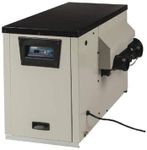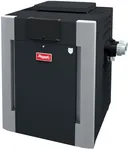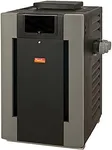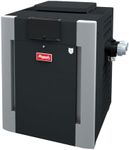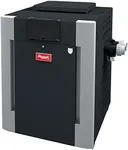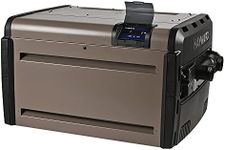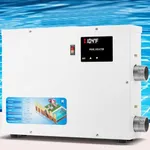Buying Guide for the Best Gas Pool Heaters
Choosing the right gas pool heater can significantly enhance your swimming experience by maintaining a comfortable water temperature, extending your swimming season, and ensuring efficient energy use. To make an informed decision, it's important to understand the key specifications and how they align with your specific needs. Here are the main factors to consider when selecting a gas pool heater.BTU OutputBTU (British Thermal Unit) output measures the heating capacity of the pool heater. This spec is crucial because it determines how quickly and effectively the heater can warm up your pool. Higher BTU ratings mean faster heating times. For small pools or spas, a heater with a lower BTU output (100,000-200,000 BTUs) may suffice. Medium-sized pools typically require heaters in the 200,000-300,000 BTU range, while large pools may need 300,000 BTUs or more. Consider the size of your pool and how quickly you want it heated when choosing the BTU output.
EfficiencyEfficiency is expressed as a percentage and indicates how well the heater converts fuel into heat. Higher efficiency means more heat is generated from the same amount of gas, leading to lower operating costs. Standard efficiency heaters range from 80-85%, while high-efficiency models can exceed 90%. If you use your pool frequently or for extended periods, investing in a high-efficiency heater can save you money in the long run. For occasional use, a standard efficiency model may be sufficient.
Type of GasGas pool heaters can run on either natural gas or propane. Natural gas is typically more cost-effective and convenient if you already have a natural gas line installed at your home. Propane heaters are a good alternative if natural gas is not available, but propane can be more expensive and requires a storage tank. Consider the availability and cost of each fuel type in your area when making your decision.
Size and InstallationThe physical size of the heater and the installation requirements are important to consider. Ensure that the heater fits in the designated space near your pool equipment and that it complies with local building codes and regulations. Some heaters may require professional installation, especially if modifications to your gas line or electrical system are needed. Measure the available space and consult with a professional installer if necessary to ensure a proper fit and safe installation.
Control FeaturesModern gas pool heaters come with various control features, such as digital thermostats, remote controls, and programmable timers. These features can enhance convenience and allow you to maintain precise control over your pool's temperature. If you prefer easy and flexible operation, look for heaters with advanced control options. For those who prefer simplicity, basic models with manual controls may be sufficient.
Durability and WarrantyDurability and warranty are indicators of the heater's quality and longevity. Look for heaters made from corrosion-resistant materials, especially if you have a saltwater pool. A good warranty can provide peace of mind and protect your investment. Warranties typically range from 1 to 5 years, with longer warranties indicating greater confidence in the product's durability. Consider the manufacturer's reputation and the warranty terms when evaluating the durability of a pool heater.
